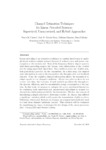Channel estimation techniques for linear precoded systems: Supervised, unsupervised, and hybrid approaches

Use this link to cite
http://hdl.handle.net/2183/15454
Except where otherwise noted, this item's license is described as Reconocimiento-NoComercial-SinObraDerivada
Collections
- Investigación (FIC) [1685]
Metadata
Show full item recordTitle
Channel estimation techniques for linear precoded systems: Supervised, unsupervised, and hybrid approachesDate
2011-07Center/Dept./Entity
Facultade de Informática, Departamento de Electrónica e Sistemas, Grupo de Tecnoloxía Electrónica e Comunicacións (GTEC)Citation
Castro-Castro, Paula-María, García-Naya, J.A., Dapena, A. & Iglesia, D. 2011, "Channel estimation techniques for linear precoded systems: Supervised, unsupervised, and hybrid approaches", Signal Processing, vol. 91, no. 7, pp. 1578-1588.
Abstract
[Abstract] Linear precoding is an attractive technique to combat interference in multiple-input multiple-output systems because it reduces cost and power consumption at the receiver. Frequency division duplex systems with linear precoding acquire the channel state information at the receiver side by using supervised algorithms. Such methods make use of pilot symbols periodically provided by the transmitter. Next, this channel state information is sent to the transmitter side through a low-cost feedback channel. Thus, the available channel information allows the transmitter to adapt signals to the channel conditions. Given that pilot symbols do not convey user data, they penalize throughput, spectral efficiency, and transmission energy consumption of the system. In this work, we propose to mitigate the aforementioned limitations by combining both supervised and unsupervised algorithms to acquire the channel state information needed by the transmitter. The key idea consists in introducing a simple criterion to determine whether the channel has suffered a significant variation which requires the transmission of pilot symbols. Otherwise, when small fluctuations happen, an unsupervised method is used to track these channel variations instead. This criterion will be evaluated by considering two types of strategies for the design of the linear precoders: Zero-Forcing and Wiener criteria.
Keywords
Linear precoding
MIMO
Blind source separation
Learning rules
MIMO
Blind source separation
Learning rules
Description
The final publication is available at Springer via http://dx.doi.org/10.1016/j.sigpro.2011.01.001
Editor version
Rights
Reconocimiento-NoComercial-SinObraDerivada
ISSN
0165-1684 (Print)
1872-7557 (On line)
1872-7557 (On line)






